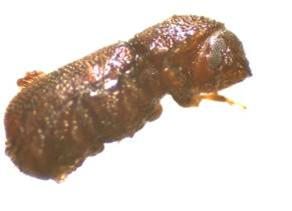U.S. Customs and Border Protection Agriculture Specialists Intercept Nine Pests in Nine Hours at Laredo Port of Entry
Written by Post Public Information Representative, Feb 24, 2012, 0 Comments
Courtesy U.S. Customs and Border Protection,
 LAREDO, TEXAS – U.S. Customs and Border Protection (CBP) agriculture specialists at the Laredo Port of Entry this week uncovered a deluge of quarantine significant pests, intercepting nine wood-boring pests in nine hours in solid wood packing material at the port’s two cargo lots.
LAREDO, TEXAS – U.S. Customs and Border Protection (CBP) agriculture specialists at the Laredo Port of Entry this week uncovered a deluge of quarantine significant pests, intercepting nine wood-boring pests in nine hours in solid wood packing material at the port’s two cargo lots.
The interceptions all occurred during a nine-hour period on Wednesday, Feb. 22, 2012 at the import lots at World Trade Bridge and Colombia-Solidarity Bridge . CBP agriculture specialists conducted examinations of wooden pallets from commercial shipments that ranged from auto parts to hexagonal netting to telephone cable. During their examinations, CBP agriculture specialists probed the pallets and discovered a total of nine quarantine significant pests, including five Cerambycidae spp., two Arhopalus spp., one Scolytidae sp. and one Pityopththorus sp. Four of the pests were intercepted at Colombia-Solidarity Bridge and five at World Trade Bridge import lot. Some of these pests have been known to cause extensive damage to trees and at times carry diseases that have adverse impact on the trees.
In each case, CBP refused entry to the shipments and they were returned to Mexico .
Solid wood packing material such as pallets bear an International Plant Protection Convention (IPPC) stamp indicating that they have either been treated with heat or with chemicals to prevent infestation by wood-boring pests. If CBP finds quarantine significant pests within these pallets, action must be taken; the wood packing material must be re-exported to Mexico .
“Our frontline CBP agriculture specialists did some amazing work this week, detecting nine actionable pests in a nine-hour period,” said Sidney Aki, Port Director, Laredo . “Our agricultural mission is vitally important to protecting American agriculture from wood boring pests not known to reside within the U.S. An infestation by these pests would be costly to contain and could result in severe economic losses for the American timber industry as well as our forests.”



